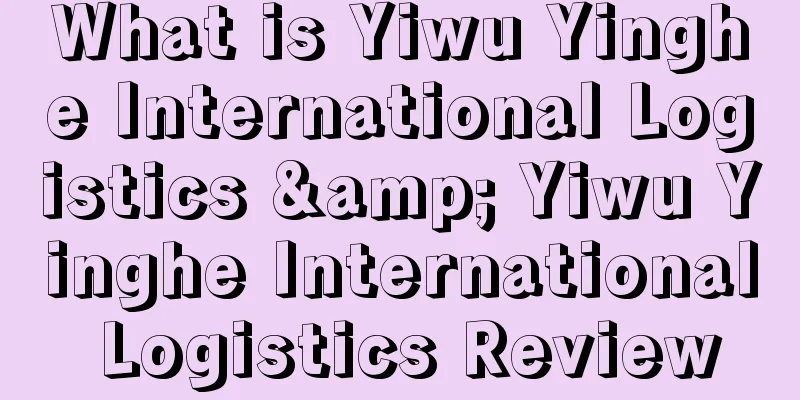Unable to bear the pressure! Shenzhen freight forwarder announced closure at the end of the year

|
This year, the freight forwarding industry has been hit by a series of setbacks, leaving people a bit confused. Now, at the end of the year, there is another big one. In the past two days, many people have been shocked by the news that Shenzhen Yunchuang International Freight Forwarding Co., Ltd. has closed down.
Due to increasing competitive pressure, freight forwarders have frequently encountered problems this year, with reports of bankruptcy and absconding. Among these freight forwarders, quite a few are in the European market. In the future, the difficulty of the European market will increase, because there is news that Belgium will adopt a reverse algorithm for customs clearance next year.
Unable to bear the pressure, 8-year freight forwarder collapsed
Recently, there has been a lot of discussion in the cross-border circle about the collapse of Yunchuang International, but there has been no clear news. Just as the discussion was intensifying, on December 14, Yunchuang International suddenly issued an announcement stating that due to the huge impact of external situations and internal capital turnover factors, after the efforts of the company's shareholders, it was still unable to obtain financial support and reverse the company's predicament. As a last resort, the company's shareholders meeting decided to close on December 14, 2023.
What caused Yunchuang International to be "forced to do so"? It listed three reasons in the announcement:
First, the detention of containers resulted in huge compensation, as well as demurrage fees and container rentals.
In January this year, 12 containers of Yunchuang International were seized in Gdansk and Mala, Poland, and the demurrage and container rentals incurred in the past year amounted to more than 2 million yuan. In addition, due to the long time of seizure of goods, compensation was paid to customers in November, and this loss exceeded 7 million yuan.
Not only that, the detention of containers also brought about a series of chain reactions, such as a decline in business volume and subsequent arrears of freight by customers.
The second is bad debts from customers.
A large amount of accounts receivable was not paid due to customers' arrears, resulting in Yunchuang International's lack of normal capital circulation. Among them, its peer client companies Zhishang, Guoren, Yaohong and others were ordered by judicial rulings to pay more than 5 million yuan.
Third, the reduction in office and labor costs indirectly resulted in a large loss.
Since the incident, Yunchuang International has also tried to save itself, and has taken measures such as reducing office and labor costs. However, these measures have also indirectly caused a lot of losses. The company moved from the old site, lost nearly 700,000 yuan in rental deposits, and spent more than 400,000 yuan on the deposit and decoration of the new office space. In addition, the employee compensation caused by layoffs was 300,000 yuan.
The direct and indirect losses exceeded 15 million yuan. Under the heavy pressure, this freight forwarding company, which had been operating for 8 years, had to close down sadly.
The cargo owner is panicking. What should be done with the goods in transit?
When any freight forwarder goes bankrupt, the sellers are the ultimate victims. After the incident with Yunchuang International, many sellers became worried about their goods in transit, fearing that they would fall into a deep pit again.
Judging from the current feedback, quite a few sellers and freight forwarders have been affected.
“——Oh my god, my goods are still in this company and will arrive at the port soon. Can they still be delivered normally? ——I have more than ten lots of goods here, what should I do? ——Six packages are stuck. It’s the end of the year and I’m still stuck. I’m speechless. ”
…
It can be seen from the above announcement that regarding the customs clearance and delivery of goods currently in transit, Yunchuang International seems to hope that the units and individuals who owe freight can pay the owed freight during their business closure period in accordance with the law, and then use these funds to handle the customs clearance and delivery of customers' goods in transit.
If this is true, it is not something that can be solved in the short term. However, according to feedback from the affected freight forwarders and sellers, Yunchuang International has already set up a group, proving that it is still taking a proactive attitude to deal with the problem.
Yunchuang International is a comprehensive supply chain service provider engaged in the first-leg transportation of European FBA. Its main service channels include European air freight FBA, European railway freight FBA, European sea freight FBA, international air freight, etc.
In the past, many freight forwarders that went bankrupt had their risk levels maxed out, but Yunchuang International was different. Qichacha showed that it only had 7 risks. Therefore, as soon as its closure announcement was issued, many industry insiders expressed regret:
“——It’s a pity that such a company closed down due to accounts receivable issues; ——I like this company very much. They have never detained any of my goods. ”
In the context of economic downturn, both sellers and freight forwarders are forced to move forward. The forced closure of Yunchuang International is a tragedy in the cross-border industry. While other freight forwarders feel sorry for it, they should also learn some lessons from it. After all, under the pressure of market downturn and strict compliance inspections, the difficulty of the European market will continue to escalate. For example, freight forwarders may soon face customs clearance reversals in Belgium.
Belgium implements reverse declaration, will it be implemented from next year?
Industry sources indicate that Belgium will use the reverse calculation method to calculate import VAT, and soon all customs clearance agencies in Liege, Belgium will receive a notice: from January 1, 2024, the customs clearance valuation method will be changed from the invoice method to the reverse calculation method or the extrapolation method. If the invoice method is continued to be used, not only will the inspection rate rise to nearly 100%, but if under-declaration is found, the penalties will be severe.
In fact, the news that Belgium’s customs clearance would implement a new policy was already widely circulated in June this year, causing a lot of panic at the time.
It is reported that after the VAT fraud case at Liege Airport in Belgium, the Belgian Customs has increased the inspection rate of imported and exported goods a lot. At the same time, it has tried to standardize import customs clearance operations through new declaration methods.
In recent years, a large number of e-commerce goods from China have generally been under-declared when clearing customs in Belgium. The Belgian Customs believes that the previous declaration of 30% of the sales amount for imported goods was unreasonable, so it decided not to uniformly use 30% of the selling price of the product sales link as the declared value of the goods.
The new calculation method is that the customs system automatically calculates the value of products that must be declared by deducting some fixed costs from the actual selling price of the product at the time of product sales. According to estimates, the declared value of this calculation method will fluctuate between 30% and 70% of the selling price of the product at the time of product sales.
This operation is tantamount to increasing sellers' costs.
As we all know, Belgium is the best port for e-commerce goods to enter the European Union, because it not only has a very mature deferred procedure, but also has a low inspection rate, fast customs clearance at the port, and quick container pickup. In addition, it has a superior geographical location and very convenient delivery.
There are two points to note about the new policy: First, for FBA goods, the declaration link must be consistent with the delivery country. For example, products sold on the French site must use the sales link of Amazon France. Second, the VAT number used must be consistent with the destination country of the goods.
Compared with the United States, Europe has more and stricter compliance requirements, so it is more difficult for sellers to operate in the European market. Now there is a trend of becoming more and more stringent. It is conceivable that sellers in the European market will face many challenges in the future. Freight forwarders are companies in the same chain, and the future will not be easy either. Yunchuang International will not be the last European freight forwarder to go bankrupt. Yunchuang International |
<<: Billion-dollar sales, but still can't pay back 30 million in 4 years
Recommend
Can small and micro toy manufacturers survive in the cracks?
Although many sellers have stated that the situat...
The parent company of Jiazhilian has interest-bearing debt of 536 million yuan
Xunxing shares' interest-bearing liabilities ...
What is Holodilnik? Holodilnik Review, Features
Refrigerator.ru is a Russian online store special...
What is Berlin Brands Group? Berlin Brands Group Review, Features
Founded in Germany in 2005, Berlin Brands Group is...
What is boots? boots Review, Features
Boots is a British beauty and skincare brand with...
What is Meteor Cross-border? Meteor Cross-border Review, Features
Meteor Cross-border E-commerce is a subsidiary of...
Etsy requires sellers to provide advance delivery information!
Recently, Etsy issued an announcement requiring s...
SHEIN has new moves
SHEIN , a fast fashion cross-border e-commerce co...
What is Guangzhou Qixiang Network Technology Co., Ltd.? Guangzhou Qixiang Network Technology Co., Ltd. Review, Features
Guangzhou Qixiang Network Technology Co., Ltd. wa...
Amazon's new seller data is out! What challenges will Chinese sellers face?
Recently, e-commerce market research company Mark...
Search volume surges 3700%! Google reveals the hot product trends for the US Independence Day
Before the much-anticipated Prime Day arrives, Am...
What is The Pill Club? The Pill Club Review, Features
Founded in 2014, The Pill Club is a women's h...
What is The Row? The Row Review, Features
The Row was founded by Ashley Olsen and Mary-Kate...
Amazon launches "FBA liquidation" plan; Shopee prohibits sellers from using official content in violation of regulations
Amazon launches "FBA liquidation" progr...
Is it easier to turn a small boat around? A 3-person Amazon team sold 50 million in one year!
According to the latest incomplete statistics, th...









